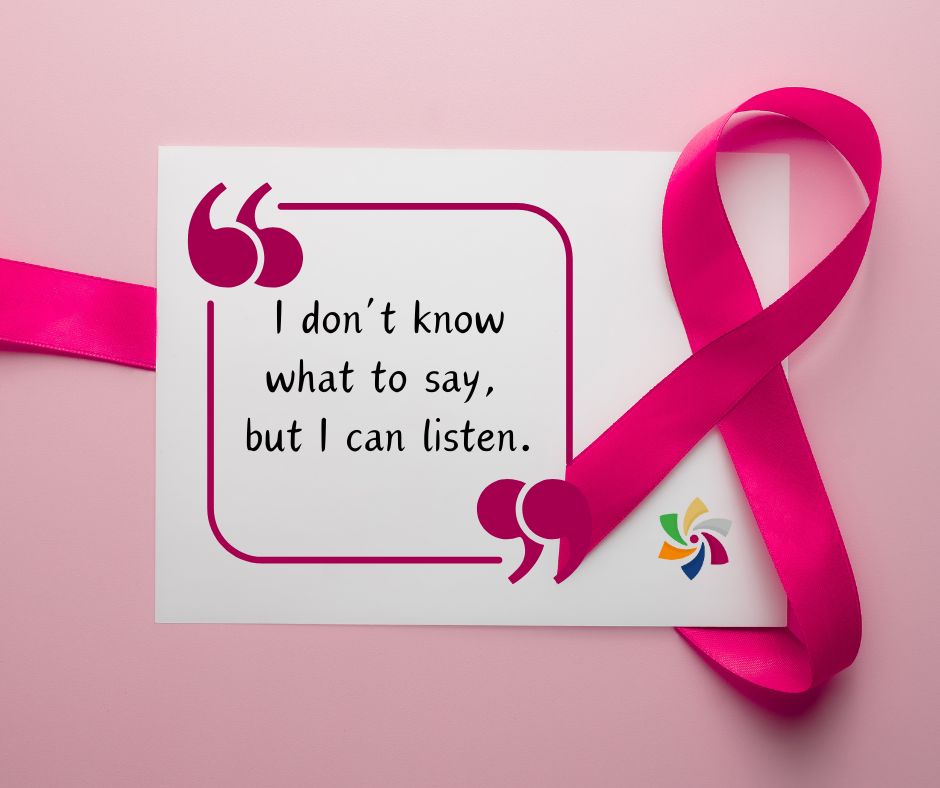Well, I think that sucks but I’ll do my best to support you

You’ve just found out your colleague has #breastcancer…
…and none of those pink-packed awareness morning teas over the years have prepared you for what you’ll say to her.*
It’s a moment that can leave you speechless and your next instinct might be to step away for fear of saying the wrong thing.
Avoidance is an obvious strategy, but not a helpful or sustainable one.
Neither is overwhelming her with your empathy as you attempt to purge the discomfort and distress you’re feeling.
Why considerate communication matters
In the workplace, where you spend so much time interacting with others, how you communicate with a colleague during her breast cancer journey matters a lot.
What you say to someone you’ve had coffee and lunch with for years will be different to what you say to the coworker you normally just smile at and nod hello while waiting for the meeting to start.
Considerate and compassionate “cancer conversations” are not just a courtesy. They’re about creating a reassuring environment that helps her maintain a sense of normalcy and connection to your workplace.
Thoughtfully expressed support can help reduce her anxiety and give her confidence in managing her workplace relationships during treatment.
What should I say (or not)?
Simple, heartfelt expressions are often the most meaningful:
- “I don’t know exactly what to say, but I want you to know I’m here for you.”
- “If you want to talk about it, I’m here to listen.”
- “How are you feeling today?”
- “What can I help with this week?”
- “Do you want me to bring you back something back from the canteen?”
- “Well, I think that sucks but I’ll do my best to support you.”
What’s not helpful:
- Comparing your feelings to what you presume hers to be
- Sharing stories about others you know who have/had cancer
- Offering unsolicited advice
- Making assumptions about the cause (do not ask if she ever smoked or was “on the Pill”)
- Telling her to “stay positive”
- Mentioning cancer or treatment in every conversation (as if that’s all she represents now)
- A patronising tone (it’s her breast, not her intelligence that’s affected)
What needs to change (or not)?
Take your cues from her. Be attentive not only to her words but to her reactions when you are talking. If she seems reluctant to talk, respect her privacy and boundaries.
Ask her (don’t assume) if she would like to change how you communicate – maybe more emails and video calls and fewer texts and Teams pings will suit her changing energy and availability.
There’ll be times you won’t know about when she’s feeling isolated and lonely. It’s not an infectious disease, so keep sending the invitations to social activities; she’ll decide what participation is possible.
*I’ve said “she” and “her” throughout this post. But more than 200 Australian men are likely to be diagnosed too over the next turn around the sun.
Finding out your male team mate has the nation’s second most commonly diagnosed cancer can be even more confronting. But your communication choices should be the same.
Sometimes, simply being present and willing to listen is the most powerful communication about cancer you can have.
***
I’m not a clinician, care nurse or breast cancer survivor. Here are the links to the expertise I sourced for this post:
https://www.breastcancertrials.org.au/breast-cancer-resources/breast-cancer-statistics/?gad_source=1
https://www.bcna.org.au/resource-hub/articles/communicating-with-team-members-and-colleagues/
https://www.cancerandcareers.org/en/at-work/coworkers/what-to-say
https://bcna-dxp.azureedge.net/media/szbjyint/bcna_fact-sheet-tips-for-managers_2018.pdf
https://www.breastcancertrials.org.au/using-respectful-language-when-communicating-with-patients/
Contemplating communication training for your team? Tap the button to book a complimentary and unconditional Tell Me More Call.